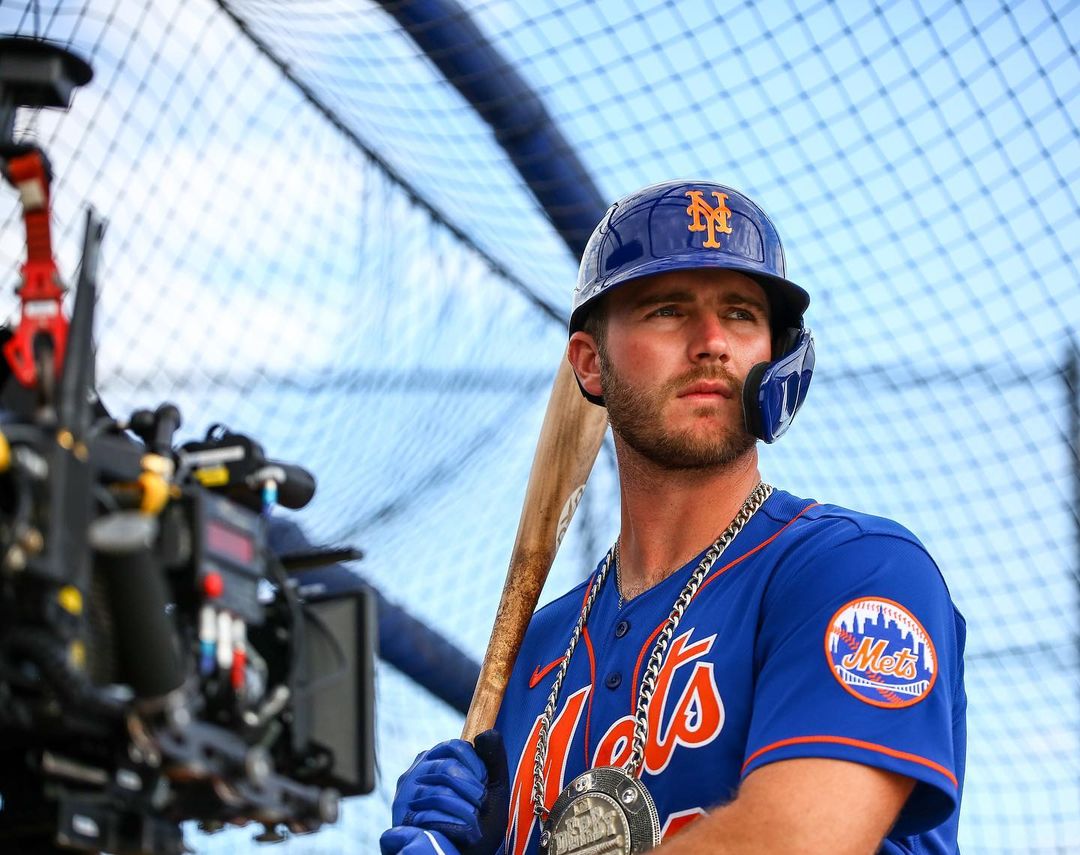

The ‘Polar Bear’ has spent six seasons with the Mets. That should mean something right? If Pete Alonso was a bad player, then everyone would understand but he isn’t. So where is the issue? Is Alonso truly demanding too much from a franchise that he has helped build? According to the Mets, yes. But according to one insider, there’s a bigger thing at play.
Watch What’s Trending Now!
The way MLB clubs evaluate player value has evolved significantly over the years, and today, one of the most critical metrics in those calculations is WAR—Wins Above Replacement. This advanced stat helps teams determine how much better (or worse) a player is compared to a league-average replacement, and it’s become a major factor in contract negotiations and roster decisions.
ADVERTISEMENT
Is Pete Alonso not getting the recognition he needs from the Mets?
According to Kansas City Royals first baseman Vinnie Pasquantino, Pete Alonso’s relatively low WAR rating is a big reason why the slugger has struggled to solidify his place with the New York Mets. Pasquantino said, “If you play first base, you essentially have to put like a .850 OPS to get paid nowadays. Which is fine, but teams use WAR, and if you play first, it is very difficult to get that WAR number up.” Despite Alonso’s prodigious power and home run-hitting ability, Pasquantino believes the Mets may be placing too much emphasis on WAR and not enough on Alonso’s intangible contributions.
Vinnie Pasquantino doesn’t think teams value first basemen enough pic.twitter.com/WMYHqp8Yv8
— Chris Rose Sports (@ChrisRoseSports) January 20, 2025
“It does not seem that they value the things that he brings to the table, other than numbers,” he added. But beyond the analytics, Pasquantino feels there’s something deeper at play—he thinks the Mets have simply “undervalued” Alonso. Whether it’s his leadership in the clubhouse, his fan-favorite status, or his ability to change a game with one swing, Pasquantino suggests that Alonso brings far more to the table than what the numbers might show. The Royals player uses the example of the Dodgers who are investing in players who are more than just mere numbers and that’s why they’re winning. This debate on the balance between analytics and traditional scouting is not new. While for some teams it has worked, for some it hasn’t.
ADVERTISEMENT
The Red Sox are a team that once had perfected the balance
Moneyball: The Art of Winning an Unfair Game. Michael Lewis’s groundbreaking book peeled back the curtain on Billy Beane’s success with the Oakland A’s, transforming him into a baseball revolutionary in a world stuck in its old ways. Beane, portrayed as a visionary in a sport filled with stubborn traditionalists, tossed aside conventional scouting wisdom and instead embraced the radical statistical analysis championed by self-taught sabermetrician Bill James. The book became a runaway bestseller, captivating fans, front offices, and even Wall Street.
ADVERTISEMENT
Fast forward a few years, and the Moneyball phenomenon had hit the silver screen. But every great story needs an ending, and that’s where Moneyball hits a snag. Despite their ingenuity and grit, Beane’s A’s could never quite slay the league’s financial giants—the Yankees, the Red Sox, and the Dodgers. They came agonizingly close but always fell just short, their slingshot missing by inches. And then, in a twist fit for Hollywood, after the 2002 season, Beane was offered the chance to take his analytics-driven philosophy to the Boston Red Sox. But, in classic Beane fashion, he declined, choosing to stay with his beloved A’s.
Top Stories
Blue Jays’ Kyle Tucker–Bo Bichette Push Turns Toronto’s Mockery Into AL East Nightmare as Yankees Face New Threat

Blue Jays to Show Exit Door to 3 Playoff Stars as Ross Atkins Plans Major Changes: MLB Winter Meeting Rumors

Francisco Lindor’s Future in Limbo as Mets Owner Breaks Silence After Pete Alonso Exit

Wild Francisco Lindor Trade Idea Surfaces After Former Mets GM Hints $341M Star Wants to Leave

Vladimir Guerrero Jr Shoots His Shot at Kyle Tucker as Blue Jays Manager Gets Real on Clubhouse Visit

Boston, left at the altar, turned to a new face: 28-year-old Theo Epstein, a young, forward-thinking executive molded in Beane’s image. And what happened next? The Red Sox, armed with a blend of old-school scouting and Beane’s revolutionary ideas, broke the Curse of the Bambino and went on to win two World Series championships. So while Moneyball may lack that perfect Hollywood ending for Beane and his underdog A’s, the story’s impact on baseball—and sports as a whole—is undeniable. It’s proof that sometimes, even if you don’t win it all, changing the game is the greatest victory of all.
ADVERTISEMENT
ADVERTISEMENT
ADVERTISEMENT
ADVERTISEMENT

